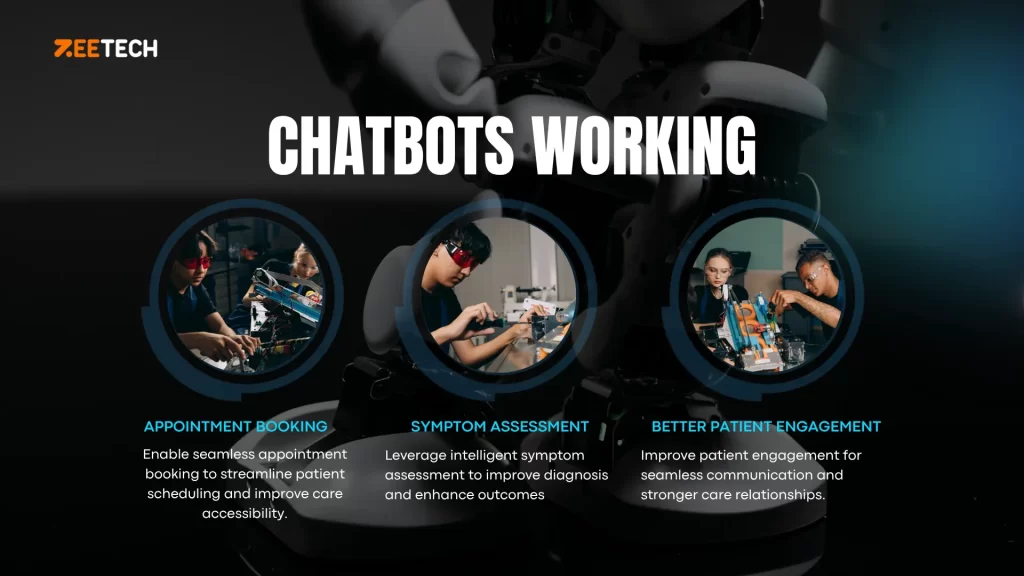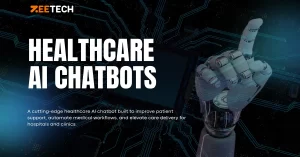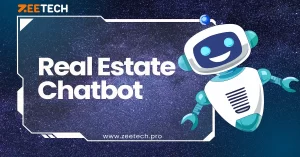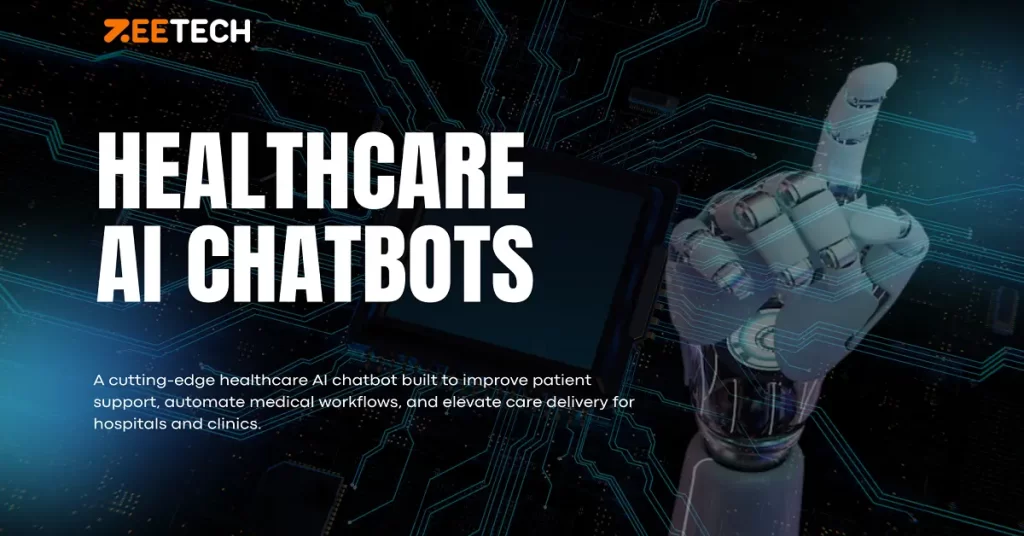AI chatbots for healthcare are turning into practical instruments in the medical field. They have become a useful tool in this industry as they enhance and speed up the communication for patients. They make it possible for them to have quick care. Everyone can benefit from these tools, including the patients and medical staff. They can plan, change, or cancel meetings with ease through these tools.
This fast communication can decrease the wait times. Patients may ask questions about their health at any time using chatbots. These online assistants also help in limiting missed appointments. For this, they can send automated reminders about doctor visits. They also send reminders for follow-ups or medications. This is helpful as it keeps patients more engaged in their treatment.
AI chatbots for healthcare are important as they help in symptom screening and triage. This helps individuals determine how they can manage the disease. It tells if they can manage it at home with care or if they require emergency medical assistance. They offer safe access to test results, lab reports, and billing data. This guarantees that patients won’t have to wait for a hospital representative to provide them with updates.
For healthcare providers, chatbots help gather information about patients. This includes their medical history or insurance details. It does this before the consultation to save time for doctors and staff. They can even translate messages and support multiple languages. This makes healthcare accessible to people from all kinds of backgrounds. Because chatbots are available all the time, patients can request assistance whenever they need it. This can be done even outside clinic times.
In simple words, healthcare chatbot development services make everything more efficient and accessible. They are focused more on patients. They decrease admin workload, improve communication, and enhance patient experience. This allows medical teams to focus more on delivering quality care. While the patients can enjoy faster, personalised, and more convenient service.
Working of A Healthcare Chatbot:
Let’s take a closer look at what healthcare chatbot development services are capable of doing.

Appointment Booking
The chatbot allows patients to make appointments immediately. This may be set up to assign a qualified physician and forward the patient’s information to the physician. This adds the appointment to the calendars of the patient and the doctor. For patients, this makes scheduling online visits easy and stress-free.
Symptom Assessment
Chatbots for healthcare are trained on medical criteria that can help patients quickly evaluate their symptoms. After that, the system can recommend prompt remedies and potential diagnoses. Users don’t have to submit their information again every time they check in because the chatbot saves personal patient data. This allows for fast symptom evaluation.
General Assistance
Medical chatbots can efficiently handle routine patient questions that are commonly asked. This assists in freeing the healthcare teams to address more advanced or critical issues. They can also offer quick access to essential patient records when required. These tools are efficient and helpful for general assistance.
Insurance Queries and Claims
Healthcare AI chatbots can help patients file claims, verify coverage, and track claim progress. This eliminates the need for repeated phone calls. This also provides patients with an easy way to access policy information. Also, healthcare staff can view patient requests and approve tasks related to billing.
Better Patient Engagement
With all-day availability, healthcare chatbots act as 24/7 support assistants. Medical staff of a hospital or clinic can depend on them. They can reply to the patient’s questions and queries at any time. This makes sure that the patients get consistent support and have improved patient satisfaction.
Mental Health Support
Specialised therapy chatbots can assist individuals dealing with mental health challenges. They provide assistance and direction for this. They are helpful resources to support mental health therapy, but they cannot take the place of certified therapists. They can even guide users through basic mental behavioural techniques.
Reminders for Medication
Chatbots in healthcare help people take their medicines as directed. They do this by reminding them on a regular basis and monitoring if they are followed. They can also educate customers about the dangers of medication and the precautions that need to be followed. To prevent any danger, this is done before they take a dose of their prescription.
Benefits of Chatbots in Healthcare:
Chatbots in healthcare ensure patients can get support at any time. They can get help from checking symptoms to planning meetings or even preparing for surgeries. All this can be done without waiting for a healthcare provider to be available. These healthcare AI chatbots provide instant and critical medical information. They share details like patient history, allergies, and old test results. This is especially essential in emergencies.
A major advantage of a healthcare chatbot or AI chatbot for medical diagnosis is its ability to deliver personalised care. It can guide patients through symptoms and suggest possible next steps. This offers personalised suggestions and makes it easy to book appointments directly. They also collect and store patient data for future reference. This enables more customised interactions and builds trust through personal engagement.
The chatbots for healthcare can handle various chats at a time. This helps increase patient engagement. Also, it allows users to connect through text, video calls, or email with ease. While doing this, they free doctors to focus on other important cases. Other than this, the healthcare chatbots can greatly decrease operational costs. They do this by automating routine tasks. This automation not only saves money but also decreases patient wait times. It delivers real-time assistance and fast responses for urgent health concerns.
In simple terms, healthcare chatbot development services ensure accurate and consistent information delivery. They minimise errors and improve the quality of care. Zeetech offers expert healthcare chatbot development services. Contact us to get strategic healthcare chatbot development. The chatbot for healthcare industry continues to enhance efficiency. This increases patient satisfaction and improves decision-making across medical environments.
How to Use A Medical Chatbot?
From a Patient’s Perspective
Patients can use a medical chatbot to manage their health needs with speed and ease. They can start by typing their symptoms into the chatbot. By doing this, they can receive guidance, possible causes, and triage suggestions. The chatbot may recommend next steps. Whether it is home care instructions or booking a doctor’s appointment.
The chatbot may also be used to remind customers to make appointments and take their medicines. They could ask standard health-related inquiries, monitor medication, and review test findings. To do this, you don’t have to call or wait in line. The chatbot offers personalised recommendations and follow-ups based on recorded personal health data. This offers a smooth, personalised healthcare experience.
From a Doctor’s Perspective
Doctors can use a medical chatbot as a digital assistant. This tool can assist in simplifying patient interaction and care delivery. They can depend on the chatbot to gather patient symptoms and history before a consultation. This saves time during appointments. The chatbot can also prioritise patient cases based on urgency. This assists them in focusing on critical care first.
Physicians can review automated medical summaries and monitor patient progress. They may utilise the chatbot for healthcare industry to automatically send reminders or follow-up messages, as well as post-visit advice. Doctors can interact via the chatbot platform for telemedicine. They can provide advice or approve appointments to make care delivery speedier.
From a Healthcare Staff Member’s Perspective
Admin staff in healthcare might use medical chatbots to reduce stress and speed up tasks. The chatbot for healthcare industry is capable of handling appointment scheduling, rescheduling, and cancellations. Furthermore, it may automatically remind patients of this. Staff can use it to share hospital information and prepare for pre-visit needs. They answer questions that are commonly asked most of the time.
Also, the staff can assist with insurance queries and claims processing. It can assist in managing patient records and directing tough queries. Staff can concentrate on providing in-person help by using these solutions with automation. These jobs no longer need human attention. This improves workflow and patient service.
Challenges in Developing Healthcare Chatbots
Developing a healthcare chatbot is more complicated than developing a standard customer support agent. It calls for accuracy, safety, and conformity to medical guidelines. Developers must navigate strict data privacy regulations like HIPAA. This guarantees secure communication, encrypted storage, and open user disclosures.
There is no compromise on accuracy. This is due to the requirement that medical chatbots rely on advice that has been scientifically proven. It should also escalate urgent issues to human specialists and offer secure reaction channels. This helps in avoiding risk and ensuring liability. Integrating with outdated hospital systems and EMRs adds complexity. This often requires custom APIs or middleware to ensure smooth data exchange.
The patients can use varied languages. This can be from medical terms to vague symptoms. So, advanced natural language understanding trained on real patient interactions is essential. User adoption also depends on trust. This means that the chatbot must respond empathetically. It should copy natural human conversation and provide quick access to live support when needed. Healthcare keeps evolving, so ongoing updates, retraining, and performance monitoring are important. They ensure that the chatbot stays relevant, safe, and reliable after deployment.
Integrating Medical Chatbots Into Daily Healthcare Routines
It might be simpler to manage your health if you incorporate a medical chatbot into your everyday routine. It will get better and more organised. Choosing what you want the chatbot to assist you with is the first step if you want to accomplish this. For example, identifying a medical condition or remembering to take prescribed medicines. There are also prompt answers to questions about health.
Set up reminders for things like taking your medication or going to doctor appointments. Also, you can do this to check your blood pressure. Try to use the chatbot every day to check symptoms, ask questions, or log health information. Do this especially if you are managing a condition like diabetes.
Many chatbots in healthcare also offer symptom checkers. They help you understand what might be wrong when you don’t feel well. But always remember, they don’t replace real doctors. To receive more individualised advice, connect your chatbot to health applications. You can also do this to fitness trackers if it is capable of doing so. Your sleep and exercise patterns will determine this.
Continue providing your doctor with critical information from the chatbot. In this way, they can provide you with better treatment. Finally, make sure the chatbot keeps your personal health details safe. Do this before sharing sensitive information. A medical chatbot may provide fast information and reminders when utilised with care. Also, it offers daily help to keep you healthier and better manage medical needs.
What is a medical chatbot?
It is an AI-based digital helper designed to assist patients and healthcare providers. It is capable of providing answers to the queries related to health. Also, this tool can help people check symptoms of a disease. It can plan patients’ meetings with doctors as well as send them reminders for the meetings. Other than this, it offers basic medical guidance as well as supports different tasks. This includes insurance queries and patient data collection.
How do patients engage with a chatbot?
Patients can interact with a medical chatbot through text or voice messages. These tools are usually available on healthcare websites. People can enter their symptoms and ask questions. They can also receive medication reminders. Also, they can view their lab reports and get follow-up support at any time. All this is done without needing to wait for medical staff.
What are the benefits of healthcare AI chatbots?
These tools make medical support speedier and more accessible. They provide support all day and limit long waiting times. Also, they help patients understand symptoms and automate meetings. This improves patient chats and allows doctors to focus on other important cases.
Can a medical chatbot diagnose illnesses?
No. Medical chatbots are able to analyse symptoms and provide advice for potential next actions. However, they do not provide a formal medical diagnosis. They offer direction, assistance with triage, and solutions. Doctors or other trained healthcare experts should, however, make the final choices about diagnosis and treatment.
Are medical chatbots safe and private?
Yes. These tools are safe when developed correctly. Healthcare chatbots follow strict data security rules and privacy laws like HIPAA. They use encryption, secure servers, and proper authentication. This makes sure that the bot protects patient information. Users should always choose trusted, verified healthcare platforms.
How do doctors and healthcare staff benefit from chatbots?
Chatbots are used by staff members and doctors to gather patient data beforehand. Schedule management and consultation time are reduced as a result. In an emergency, these technologies can deliver reminders and responses to typical questions. This boosts productivity, decreases work, and allows medical teams to help other patients.
Can we take mental health support from a medical chatbot?
Indeed. Many chatbots in healthcare offer emotional support, mental-behavioural methods, and mental-health guidance. They are not, however, a substitute for licensed therapists; rather, they serve as support tools. Users are always referred to qualified mental health care specialists for significant problems.






